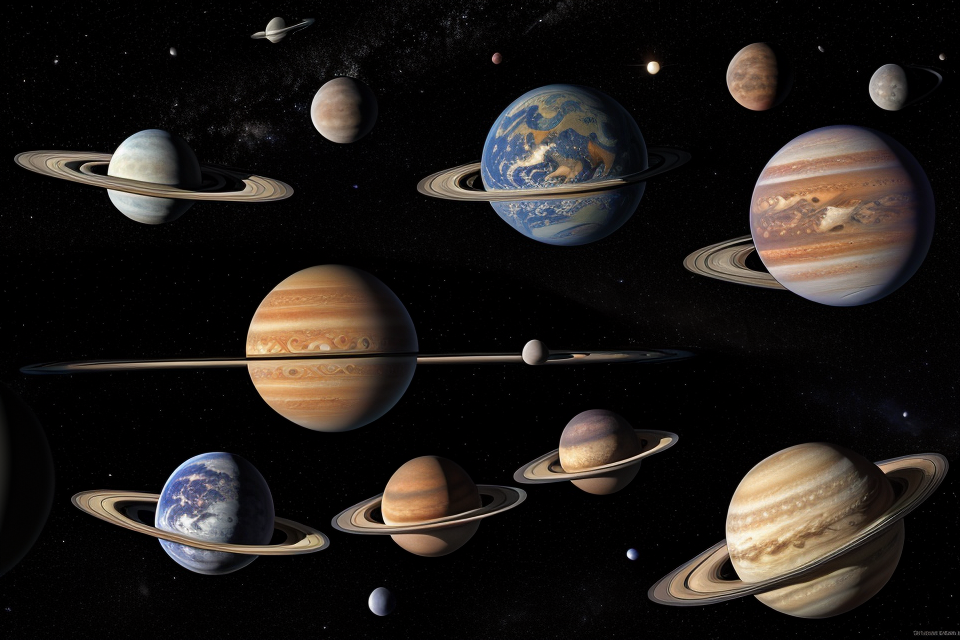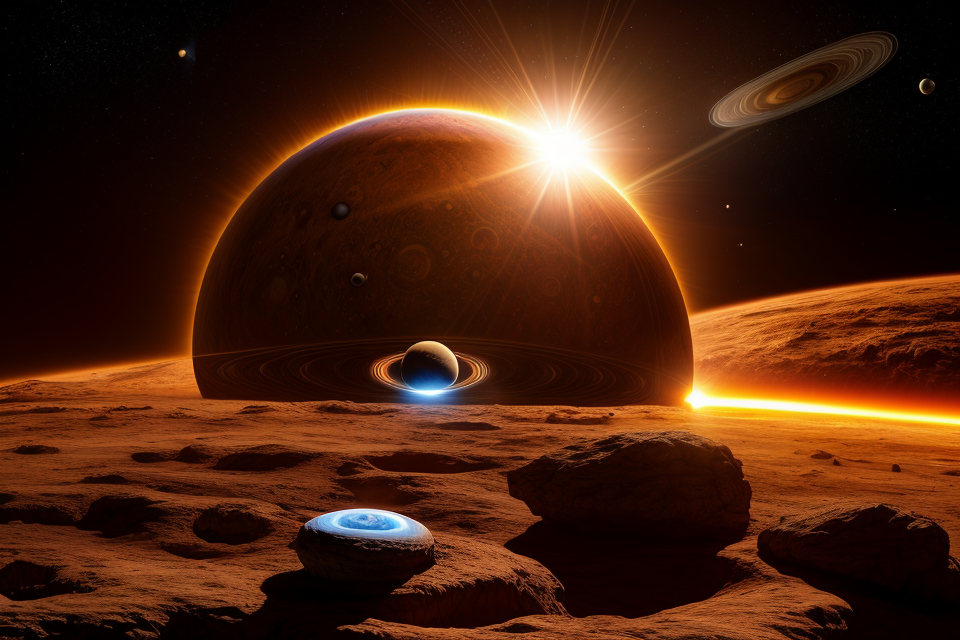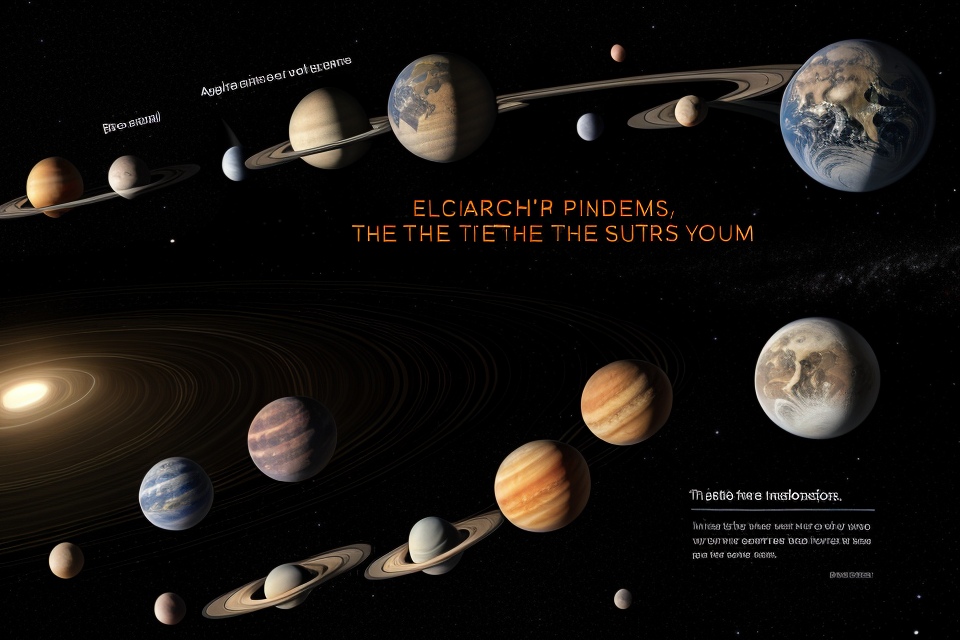The solar system is a complex and fascinating arrangement of planets, moons, comets, and other celestial bodies that revolve around the sun. It is the center of our universe and plays a crucial role in the existence of life on Earth. In this article, we will explore the importance of the solar system and why it is essential for our survival. From providing us with energy to regulating the Earth’s climate, the solar system has a profound impact on our planet and our lives. So, let’s dive in and discover the wonders of the solar system and why it’s vital for our future.
The Solar System: Our Home in Space
What is the Solar System?
The Solar System is a complex and fascinating system of celestial bodies that revolve around the Sun. It consists of a variety of objects, including planets, dwarf planets, moons, asteroids, comets, and other smaller objects. The Solar System is the only known system in the universe where life exists, and it provides us with the essential conditions for life to thrive.
The Sun is the center of the Solar System, and all of the objects in the system orbit around it due to its massive gravitational pull. The Sun is a star, and it is classified as a G-type main-sequence star, also known as a yellow dwarf star. It is about 93 million miles (150 million kilometers) away from the Earth, and it is responsible for providing the planet with warmth and light.
The Solar System also includes eight planets, which are all different sizes and have unique characteristics. The largest planet in the Solar System is Jupiter, which is also known as a gas giant. It is about 317 times larger than the Earth and has a massive atmosphere composed of hydrogen and helium. The smallest planet in the Solar System is Mercury, which is only about one-third the size of the Earth. It is the closest planet to the Sun and has a rocky surface.
In addition to the planets, the Solar System also includes dwarf planets, which are similar in size to planets but do not have the same clear definition of a planet. The most well-known dwarf planet in the Solar System is Pluto, which was reclassified from a planet to a dwarf planet in 2006. Pluto is located in the Kuiper Belt, which is a region of the Solar System beyond Neptune that contains many small icy objects.
The Solar System also has a number of moons, which are natural satellites that orbit around planets. The largest moon in the Solar System is Ganymede, which orbits around Jupiter and is larger than the planet Mercury. The Earth has one natural satellite, which is called the Moon.
Asteroids and comets are also part of the Solar System. Asteroids are small, rocky objects that orbit the Sun, and they are also known as minor planets. Comets are icy objects that originate from the Kuiper Belt or the Oort Cloud, which is a region of the Solar System even further away from the Sun. Comets are known for their bright, coma-like appearance when they pass close to the Sun and are made up of ice and dust.
Overall, the Solar System is a fascinating and complex system of celestial bodies that provide us with the conditions necessary for life to exist. Understanding the Solar System is essential for understanding our place in the universe and the role that it plays in supporting life on Earth.
The Sun: Our Star
The Sun is a star located at the center of the Solar System. It is the largest object in the Solar System and provides light and heat to Earth, making life possible on our planet.
The Sun is a massive celestial body that is classified as a G-type main-sequence star, also known as a yellow dwarf star. It is composed primarily of hydrogen and helium, with trace amounts of other elements. The Sun’s gravity is what holds the Solar System together, and its energy through nuclear fusion provides light and heat to the planets, including Earth.
The Sun’s mass is approximately 330,000 times greater than that of Earth, and its diameter is about 109 times larger. Its internal convective motion generates magnetic fields, which can cause sunspots, solar flares, and coronal mass ejections. These phenomena can affect the Solar System, including Earth, by causing auroras, radiation storms, and disruptions to satellite operations.
The Sun’s energy output is measured in units of power called watts. Its total energy output over time is referred to as its luminosity, which is approximately 382,000 times greater than that of Earth. The Sun’s energy output is primarily in the form of light, with a surface temperature of about 5,500 Kelvin. However, the temperature can vary significantly in different layers of the Sun, with the core reaching millions of degrees Celsius.
The Sun’s gravitational pull is what keeps the planets of the Solar System in orbit around it. Its mass is distributed in a way that creates a spherical shape, with the Sun’s gravity pulling everything towards its center. The Sun’s gravity is what gives the Solar System its overall shape and stability, and it is responsible for the tides on Earth, which are caused by the Moon’s gravitational pull.
Overall, the Sun is a vital component of the Solar System, providing light and heat to Earth, making life possible on our planet. It is also the primary source of energy for the Solar System, powering the various celestial bodies and phenomena that make up our cosmic neighborhood.
The Planets: Our Neighborhood
The Solar System is comprised of eight planets, each with their own distinct characteristics and features. These planets are not only our closest neighbors in space but also provide us with valuable insights into the vast diversity of our universe.
- Mercury is the smallest planet in our Solar System and is named after the Roman messenger god. It has no natural satellites and is classified as a terrestrial planet due to its rocky surface and high temperature.
- Venus is known as the “Hell Planet” due to its extreme heat and atmosphere. It is named after the Roman goddess of love and beauty and is the closest planet to the Earth.
- Earth is the third planet from the Sun and is the only known planet to support life. It is the largest of the terrestrial planets and has one natural satellite, the Moon.
- Mars is named after the Roman god of war and is known for its reddish appearance. It is the second smallest planet in the Solar System and has two natural satellites.
- Jupiter is the largest planet in the Solar System and is named after the Roman king of the gods. It has eight natural satellites and is classified as a gas giant due to its massive atmosphere.
- Saturn is the sixth planet from the Sun and is named after the Roman god of agriculture. It has eight natural satellites and is classified as a gas giant due to its massive atmosphere.
- Uranus is the seventh planet from the Sun and is named after the Greek god of the sky. It has twenty-seven natural satellites and is classified as an ice giant due to its composition.
- Neptune is the eighth and farthest planet from the Sun and is named after the Roman god of the sea. It has twelve natural satellites and is classified as an ice giant due to its composition.
These planets are our closest neighbors in space and provide us with valuable insights into the vast diversity of our universe. They are all unique in their own way and provide us with a glimpse into the vastness of space and the endless possibilities that it holds.
The Benefits of the Solar System
Study and Learn about Other Worlds
The Solar System offers us a unique opportunity to study and learn about other worlds. Through the exploration of our Solar System, we have gained valuable insights into the formation and evolution of planets, moons, and other celestial bodies. By studying the diverse range of environments found within our Solar System, we have also expanded our understanding of the potential for habitability and the search for extraterrestrial life.
Potential for Resource Exploration and Utilization
Another significant benefit of the Solar System is the potential for resource exploration and utilization. The Moon, for example, is believed to contain significant amounts of water ice, which could be used for future space missions. Additionally, asteroids and other celestial bodies are thought to contain valuable resources such as precious metals and rare earth elements, which could be utilized for a variety of applications on Earth.
Inspiration and Wonder for Generations to Come
Finally, the Solar System provides inspiration and wonder for generations to come. The awe-inspiring landscapes of Mars, the intricate web of gravity that holds our Solar System together, and the vastness of the universe all contribute to a sense of wonder and curiosity that has driven humankind to explore and discover for centuries. The Solar System continues to captivate our imaginations and inspire us to reach for the stars.
The Importance of the Solar System to Life on Earth
The Sun’s Role in Sustaining Life
The Sun is the central component of the solar system and plays a crucial role in sustaining life on Earth. It is the primary source of energy for the planet, providing warmth and light that enable a wide range of biological processes. The Sun’s energy drives the processes of photosynthesis, which is the basis of the food chain and the foundation of life on Earth. In addition, the Sun’s heat and light also regulate the Earth’s climate, creating the conditions necessary for the development and survival of living organisms.
Photosynthesis
Photosynthesis is the process by which plants, algae, and some bacteria convert sunlight into energy. This process involves the absorption of light by pigments such as chlorophyll, which converts carbon dioxide and water into glucose and oxygen. This process releases energy that is stored in the form of ATP, which is used by cells to carry out a wide range of biological functions.
The energy produced by photosynthesis is the foundation of the food chain, as it is the primary source of energy for all living organisms. Plants and algae use this energy to grow and produce the oxygen that we breathe. Animals, in turn, consume plants and other organisms that have consumed plants, and use the energy from their food to fuel their own growth and metabolism. Without the energy from photosynthesis, life on Earth would not be possible.
Climate Regulation
In addition to its role in sustaining life, the Sun also plays a critical role in regulating the Earth’s climate. The Sun’s heat and light provide the energy that drives the Earth’s weather patterns, creating the conditions necessary for the development and survival of living organisms. The Sun’s energy also drives the Earth’s ocean currents, which help to distribute heat and nutrients around the planet.
The Sun’s energy also plays a critical role in the Earth’s carbon cycle, which is the process by which carbon dioxide is exchanged between the atmosphere, the oceans, and the land. The Sun’s heat and light drive the processes of evaporation and precipitation, which move carbon dioxide from the atmosphere into the oceans and the land. This helps to regulate the concentration of carbon dioxide in the atmosphere, which in turn affects the Earth’s climate.
Overall, the Sun’s role in sustaining life on Earth is critical, and without it, life on our planet would not be possible. Understanding the importance of the Sun and the solar system is essential for understanding the complex web of life on Earth and the processes that sustain it.
The Impact of the Solar System on Our Planet
The Solar System has a profound influence on the Earth, and its gravitational forces play a crucial role in shaping our planet’s orbit. The Sun, which is the center of the Solar System, is the primary source of light and heat, providing the energy necessary for life to exist on Earth. Without the Sun, our planet would be a frozen, lifeless world.
Moreover, the Solar System also acts as a protective shield for the Earth, deflecting harmful cosmic rays and other forms of radiation that could be harmful to life. The gravitational forces of the Solar System also help to keep dangerous objects, such as comets and asteroids, at bay, preventing them from colliding with the Earth and causing catastrophic damage.
However, the Solar System can also pose a threat to the Earth, as evidenced by the impact of comets and asteroids in the past. The impact of a large asteroid or comet could have devastating consequences for the Earth, leading to widespread destruction and loss of life. Therefore, it is essential to understand the Solar System and its potential threats to the Earth, so that we can take appropriate measures to protect ourselves and our planet.
The Future of the Solar System and Life on Earth
As humanity continues to explore and understand the Solar System, it is important to consider the potential impacts of our activities on other worlds and the importance of preserving the Solar System for future generations.
- Exploration and Exploitation
- Advances in technology have enabled us to explore the Solar System in greater detail than ever before, but this exploration may also lead to exploitation of resources on other worlds.
- The discovery of water on the Moon and the potential for mining asteroids for valuable metals and minerals highlights the potential for resource extraction in the Solar System.
- However, the exploitation of resources on other worlds must be carefully managed to ensure that it does not harm the delicate balance of the Solar System or the potential for life on other worlds.
- Environmental Impact
- Human activity in the Solar System can have a significant impact on the environment, both on other worlds and on Earth.
- The use of powerful rocket engines and other technologies can generate pollution and debris in space, which can have negative impacts on the environment and the ability of future missions to explore the Solar System.
- Therefore, it is important to consider the environmental impact of our activities in the Solar System and to develop technologies and policies that minimize these impacts.
- Preservation for Future Generations
- The Solar System is a unique and valuable resource that should be preserved for future generations.
- Human activity in the Solar System has the potential to damage or destroy delicate ecosystems and the potential for life on other worlds.
- Therefore, it is important to develop policies and technologies that minimize the impact of human activity on the Solar System and to ensure that the Solar System is preserved for future generations to explore and appreciate.
In conclusion, the future of the Solar System and life on Earth are closely linked, and it is important to consider the potential impacts of human activity on other worlds and to preserve the Solar System for future generations. By developing policies and technologies that minimize the impact of human activity on the Solar System, we can ensure that the Solar System remains a valuable resource for future generations to explore and appreciate.
The Importance of Space Exploration and the Solar System
The Benefits of Space Exploration
Advancements in Technology
One of the primary benefits of space exploration is the advancements in technology that it facilitates. The harsh conditions of space require innovative solutions for communication, navigation, and power generation. These innovations have far-reaching implications, from improving communication systems on Earth to developing new sources of clean energy.
Scientific Discovery
Space exploration has also led to significant scientific discoveries, from the detection of water on Mars to the study of cosmic radiation. These discoveries expand our understanding of the universe and provide valuable insights into the origins and evolution of our solar system. Additionally, the data collected from space exploration can be used to improve our understanding of Earth’s environment and climate.
Inspiration and Motivation
Finally, space exploration provides inspiration and motivation for future generations. The wonder and excitement of space exploration capture the imaginations of people of all ages, sparking a passion for science, technology, engineering, and mathematics (STEM) fields. This inspiration can lead to a new generation of scientists, engineers, and explorers who will continue to push the boundaries of what is possible in space.
In conclusion, the benefits of space exploration are numerous and far-reaching. From advancements in technology to scientific discovery, and from inspiration to motivation, space exploration is essential for the continued growth and progress of humanity.
The Role of the Solar System in Space Exploration
As a Proving Ground for New Technologies and Techniques
The Solar System serves as a testing ground for new technologies and techniques that will be used in future space missions. By sending probes and spacecraft to explore the planets and other celestial bodies within our own solar system, scientists and engineers can test out new equipment, techniques, and scientific instruments in a controlled environment before sending them off to more distant and challenging destinations.
As a Stepping Stone for Future Missions to Other Stars and Planets
Furthermore, the Solar System is also a crucial stepping stone for future missions to other stars and planets. The distance between Earth and other star systems is vast, and current propulsion technology makes it difficult to travel such vast distances in a reasonable amount of time. Therefore, missions to other star systems are typically sent to those that are closest to Earth, such as the nearby exoplanets. However, these exoplanets are still many light-years away, and sending a mission to one of these planets would take many years to reach its destination. By using the Solar System as a proving ground for new technologies and techniques, scientists and engineers can work towards developing the technology necessary to send missions to these more distant destinations.
The Importance of Protecting the Solar System
As we continue to explore and utilize the resources of the Solar System, it is important to consider the potential impacts on other worlds and to take steps to protect the Solar System for future generations.
- The Solar System is a delicate and complex system that is home to a diverse range of celestial bodies, including planets, moons, asteroids, comets, and other objects.
- The impact of human activities on the Solar System can have significant consequences, including the alteration of the orbits of celestial bodies, the contamination of sensitive environments, and the potential for collision and impact events.
- It is important to protect the Solar System for future generations by taking steps to minimize the risks of such impacts and to ensure the long-term sustainability of space activities.
- This includes the development of regulations and guidelines for the use of resources in space, the implementation of environmental protection measures, and the establishment of best practices for space exploration and utilization.
- Additionally, the protection of the Solar System is also important for the continued advancement of scientific knowledge and the potential discovery of new worlds and resources.
- The preservation of the Solar System also allows for the potential for future generations to continue to explore and benefit from the resources and opportunities it provides.
FAQs
1. What is the solar system and why is it important?
The solar system is a collection of celestial bodies, including the sun and its planets, dwarf planets, moons, asteroids, comets, and other objects, all orbiting around it. The solar system is important because it provides us with a better understanding of our universe and how it works. It helps us to understand the origins of our planet and the origins of life on Earth. It also provides us with valuable resources such as water, which is essential for life, and helium, which is used in many industries.
2. What is the purpose of studying the solar system?
The purpose of studying the solar system is to gain a better understanding of our universe and how it works. By studying the solar system, we can learn about the origins of our planet and the origins of life on Earth. We can also learn about the history of our solar system and how it has evolved over time. Additionally, studying the solar system can help us to identify potential threats to our planet, such as asteroids and comets, and to develop strategies to mitigate these threats.
3. How does the solar system impact our daily lives?
The solar system impacts our daily lives in many ways. For example, the sun provides us with warmth and light, making life on Earth possible. The sun’s energy is also used to generate electricity, which powers our homes, businesses, and industries. Additionally, the resources found in the solar system, such as water and helium, are used in many industries and are essential for life on Earth. Finally, the study of the solar system has led to many technological advancements, such as the development of solar panels and space exploration.
4. What are some of the challenges associated with studying the solar system?
There are many challenges associated with studying the solar system, including the vast distances involved and the lack of resources available in space. Additionally, studying the solar system requires advanced technology and specialized equipment, which can be expensive and difficult to develop. Finally, studying the solar system can also be dangerous, as it involves traveling to remote and hostile environments.
5. What are some of the benefits of studying the solar system?
The benefits of studying the solar system are numerous. For example, studying the solar system can help us to understand the origins of our planet and the origins of life on Earth. It can also help us to identify potential threats to our planet and to develop strategies to mitigate these threats. Additionally, studying the solar system has led to many technological advancements, such as the development of solar panels and space exploration. Finally, studying the solar system can inspire us to learn more about the universe and our place in it.



